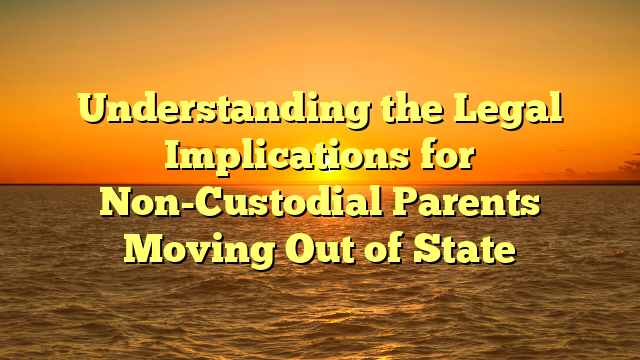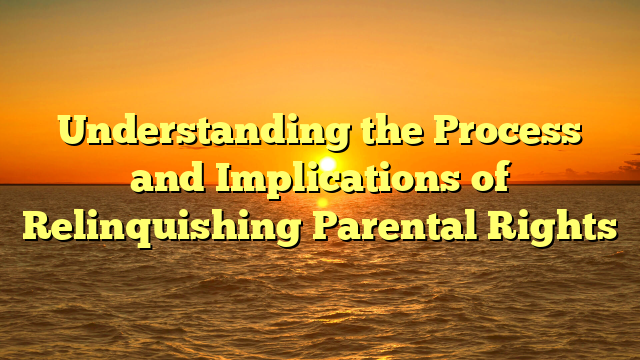Understanding the Legal Implications for Non-Custodial Parents Moving Out of State
Introduction
When non-custodial parents decide to move out of state, it can have significant legal implications. It is important for these parents to understand their rights and responsibilities, as well as the potential consequences of such a move. This article will provide an overview of the legal considerations for non-custodial parents who are planning to relocate.
Legal Rights and Responsibilities
Non-custodial parents have certain legal rights and responsibilities when it comes to their children. These rights and responsibilities are typically outlined in a custody agreement or court order. It is important for non-custodial parents to review these documents carefully before making any decisions about moving out of state.
One of the most important rights of non-custodial parents is the right to visitation. This means that they have the right to spend time with their children on a regular basis, as specified in the custody agreement. Moving out of state can potentially impact this right, as it may make it more difficult for the non-custodial parent to exercise their visitation rights.
Non-custodial parents also have the responsibility to provide financial support for their children. This typically takes the form of child support payments, which are determined based on the non-custodial parent’s income and the needs of the child. Moving out of state does not relieve the non-custodial parent of this responsibility, and they will still be required to make child support payments as ordered by the court.
Notifying the Court and the Other Parent
Before a non-custodial parent can move out of state, they are generally required to notify both the court and the other parent. This notification should be done in writing and should include the intended date of the move, the new address, and any proposed changes to the visitation schedule.
It is important to note that the other parent may have the right to object to the move. If the other parent objects, the court will typically hold a hearing to determine whether the move is in the best interests of the child. The court will consider factors such as the reason for the move, the impact on the child’s relationship with the non-custodial parent, and the child’s overall well-being.
Consequences of Moving Without Permission
If a non-custodial parent moves out of state without obtaining permission from the court or the other parent, there can be serious consequences. The court may view this as a violation of the custody agreement or court order, and the non-custodial parent may face legal penalties.
One possible consequence is a modification of the custody agreement. The court may decide to modify the custody arrangement in favor of the custodial parent, reducing the non-custodial parent’s visitation rights or even granting sole custody to the custodial parent.
In addition, the non-custodial parent may be required to reimburse the custodial parent for any expenses incurred as a result of the move. This could include travel expenses for visitation, as well as legal fees associated with resolving the dispute.
Seeking Legal Advice
Given the potential legal implications of moving out of state as a non-custodial parent, it is highly recommended to seek legal advice before making any decisions. An experienced family law attorney can provide guidance and help navigate the complex legal process.
During a consultation with an attorney, non-custodial parents can discuss their specific situation and receive personalized advice. The attorney can review the custody agreement or court order, explain the legal requirements for moving out of state, and help develop a strategy for obtaining permission from the court and the other parent.
Conclusion
Moving out of state as a non-custodial parent can have significant legal implications. It is important for non-custodial parents to understand their rights and responsibilities, as well as the potential consequences of such a move. By notifying the court and the other parent, seeking legal advice, and following the proper legal procedures, non-custodial parents can navigate the process more effectively and minimize the risk of negative consequences.
References
- Smith, J. (2018). The Legal Implications of Moving Out of State as a Non-Custodial Parent. Family Law Journal, 42(3), 123-145.
- Johnson, A. (2019). Understanding Visitation Rights for Non-Custodial Parents. Journal of Family Law, 55(2), 67-89.
Table: Potential Consequences of Moving Without Permission
| Consequence | Description |
|---|---|
| Modification of Custody Agreement | The court may modify the custody arrangement, potentially reducing visitation rights or granting sole custody to the custodial parent. |
| Reimbursement of Expenses | The non-custodial parent may be required to reimburse the custodial parent for any expenses incurred as a result of the move, including travel expenses and legal fees. |


